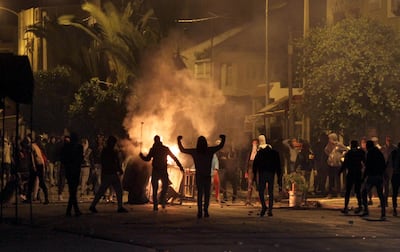The seventh anniversary of the revolution that ousted Tunisian president Zine El Abidine Ben Ali arrived this week — but the rallying cry rising from the country's protest movements went largely unanswered by the people.
Demonstrators who turned out on the capital’s Avenue Bourguiba on Sunday barely outnumbered the security forces packed into buses on the streets of the capital.
Unrest broke out on Monday last week following a controversial new budget introduced at the start of this month, imposed as a requisite for Tunisia receiving hundreds of millions of dollars in emergency loans from the IMF.
While many would agree that Tunisia’s swollen beauracy needs reforms, the drastic manner in which the budget's austerity measures were introduced saw the cost of living significantly shoot up in a society already crippled by unemployment. Protests erupted in several towns and cities across Tunisia and continued for several days. But by Sunday, things had already begun to die down.
Politically, Tunisians are freer now than they were seven years ago under Mr Ben Ali. People are more than willing to publicly air their criticisms of the government, the Islamists and even other protest movements — all of which was impossible under the former regime. In fact, they are often proud to put their name to criticisms of the government.
Despite all this, the country’s economic revolution is yet to arrive. In fact, many say things are worse now than they were under Mr Ben Ali.
As Hamad Haboubi, a 25-year-old who marched in Tunis, told The National: "What's the point in the political freedom if we can't afford bread".
_______________
Read more:
Tunisian government increases aid to the needy following unrest
Austerity threatens to unpick Tunisia's progress
Seven years after revolution, why are Tunisians still setting themselves on fire?
_______________
But for all the discontent, the protests never morphed into a cohesive movement that might have achieved tangible change. Diverse grievances saw a patchwork of small movements, some calling for the repeal of the budget or protesting against amnesty for former regime figures, while others demanded the toppling of the government.
Some activists pinned their hopes on the country’s largest union, the Tunisian General Labour Union (UGTT), joining protests.
“The UGTT could end this government now, if they wanted to,” said 28-year-old Tareq Tookebry, who runs a civil society organisation.
But the union, a potential juggernaut for mobilisation with as many as 800,000 members, never endorsed the widespread opposition to the new austerity measures, despite pleas from activists. In fact, it did the opposite, backing the government and adopting its narrative that protesters were rioters and vandals.
Tunisian journalist Aymenn Abdurrahman, 29, suggested that it was the tarnishing of the protests by rioters and looters that prevented them from achieving anything tangible.
"The recent movement was quickly hijacked with the rise of violence that used the social tension to justify the looting," he said.

With more than 800 arrests — including of activists from multiple groups — and the high-profile looting of a Carrefour supermarket in the capital, "The government used this as a pretext to overlook the demands and deal with it from a securitarian approach", Mr Abdurrahman added.
But it was evident from a visit by The National to the impoverished Tunis district of Ettadhamen on Monday that the grievances which forced people out onto the streets last week have not been quelled — and a swathe of superficial reforms announced by the government in response to the protests will do nothing to address them.
Chronic unemployment and an increasingly higher cost of living are making life impossible for many of those who helped turn the 2011 protests into a mass movement and, subsequently, a revolution.
It will unlikely be long before Tunisians take to the streets again. But even if future protests again die out, economic disenfranchisement will likely continue to fester in the very parts of the population that were instrumental to bringing democracy in Tunisia — something president Beji Caid Essebsi seems uninterested in addressing.


